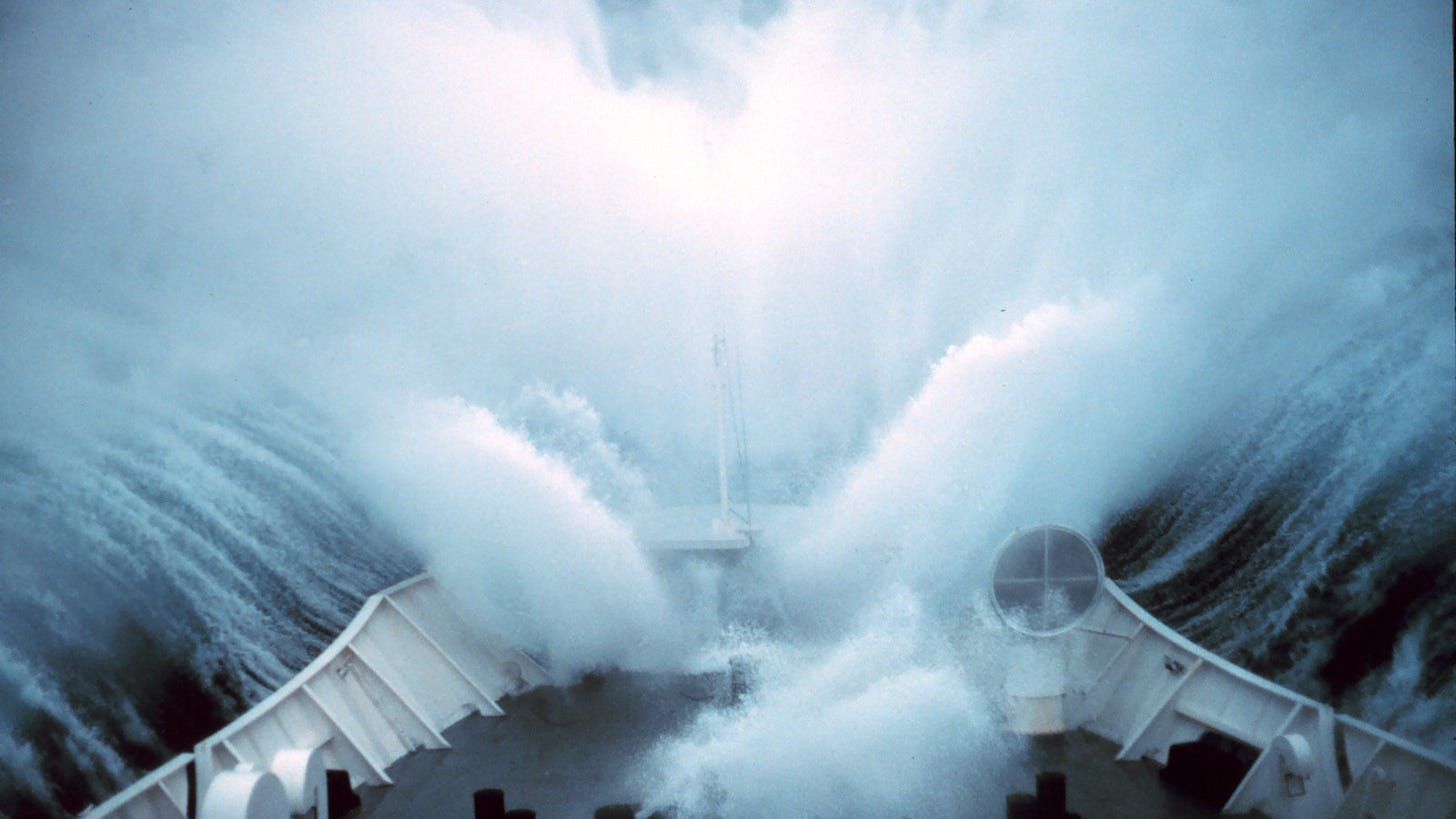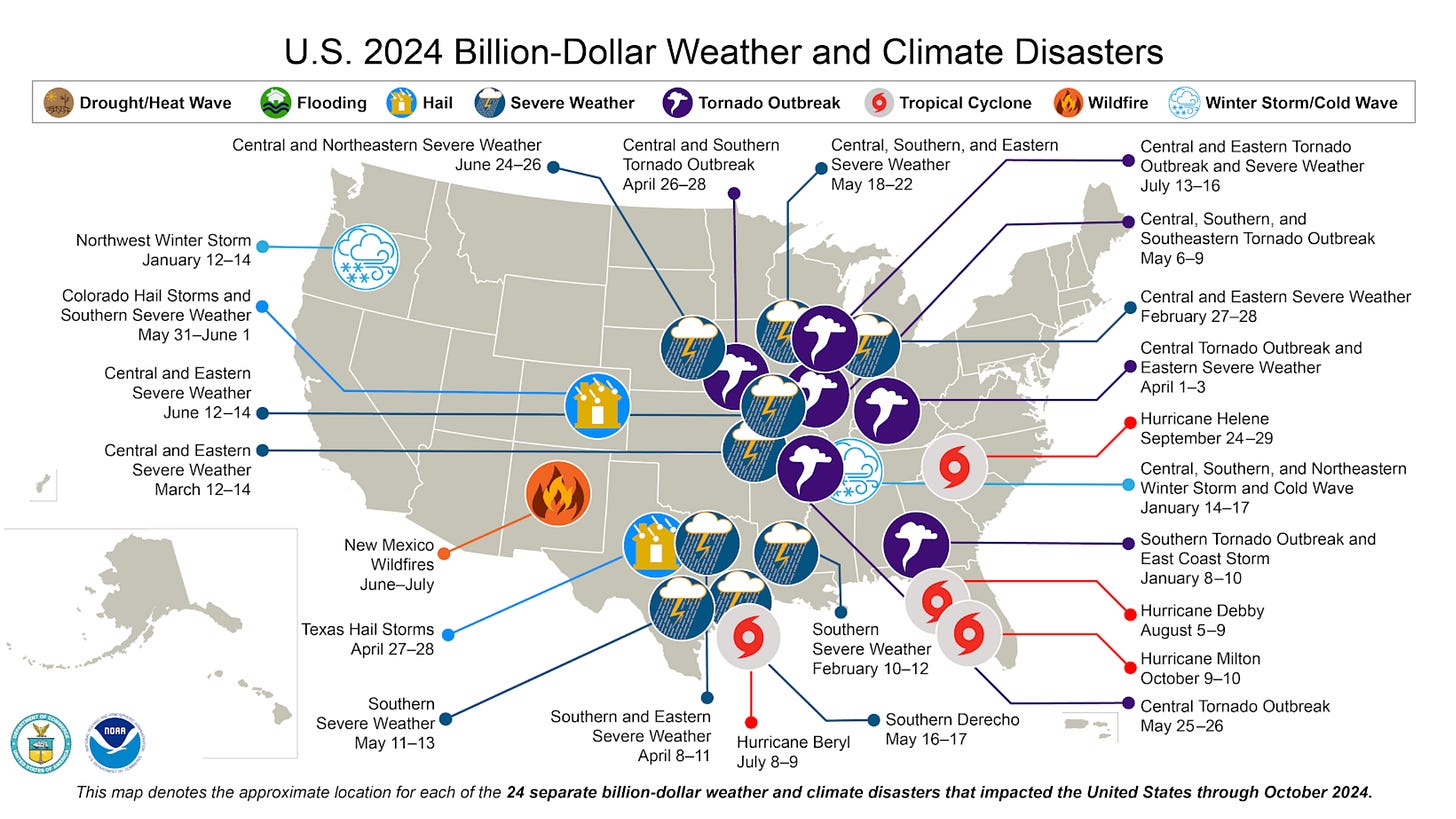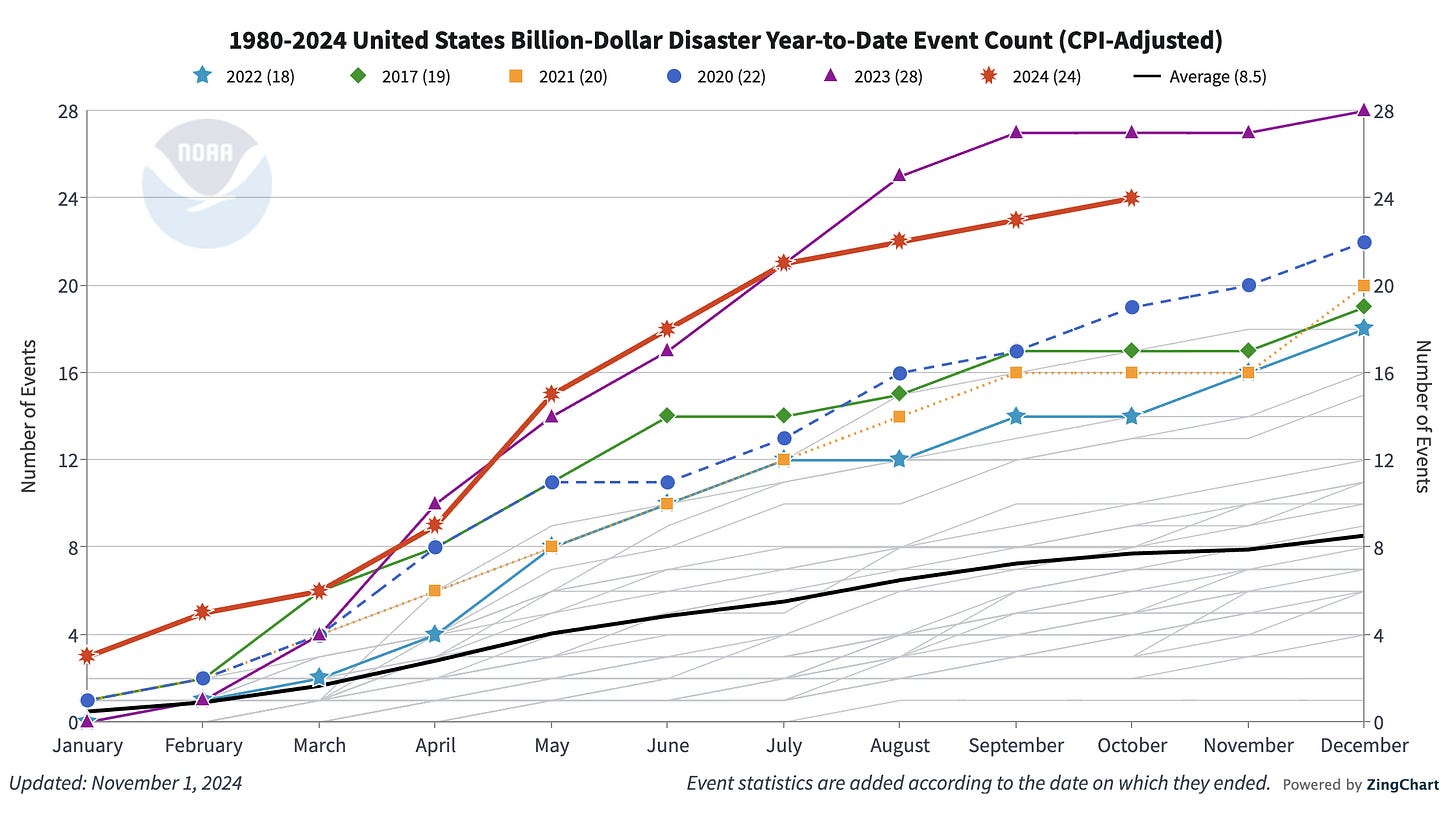1.6 Degrees
The only summary of 2024 that matters
According to the United Nations, 2024 will be the hottest year on record, when that organization releases official numbers in January. It also says that each of the 10 hottest years has come in the last decade.
Update: on January 10, the World Meteorological Organization confirmed that 2024 averaged 1.55 degrees above pre-industrial.
How hot was it? Let’s ask the Copernicus Climate Change Service, which measures such things on behalf of the European Union. According to them:
“November 2024 was 1.62°C above the pre-industrial level and was the 16th month in a 17-month period for which the global-average surface air temperature exceeded 1.5°C above pre-industrial levels.”
This was actually only the second hottest November on record, according to C3S November, 2023 measured 1.75 degrees above pre-industrial.
Now I can sense my friend Joe Brown, who runs a Substack about minimizing your personal climate impact called One5C, spinning up his pedal-powered phone to compose a text about how this doesn’t mean the planet has officially exceeded the 1.5-degree target laid out in the Paris Agreement. He’ll explain that would take a multi-year, if not decade-long average, and can only be measured and agreed upon after the fact. And while Joe is absolutely correct on that technicality, 1.5 degrees was only ever an arbitrary number to begin with. If world leaders can hang the ability for our planet to support human life around a nice-sounding number, then I don’t think it’s irresponsible to acknowledge we’re currently in excess of that temperature.
To me, that’s the biggest takeaway as we head into 2025. A line in the sand that the world’s nations thought they could defend has been breached less than a decade after it was drawn. The climate disaster is outpacing our ability to understand or predict it, and we’re seeing its effects in real time.
But Helene didn’t happen to me. My house wasn’t flooded, my truck wasn’t damaged by hail, and only one family I know had to flee a wildfire this year. So why do I care? This pails in comparison to the people mourning loved ones, permanently displaced or still rebuilding in the Appalachians, or the people who lost their homes or lives to tornadoes in Texas and Mississippi last night. But like each of you, I can see the climate disaster's impacts right in front of me.
I’m writing this from our family cabin up by Glacier National Park, where my wife and I have spent every holiday break for the last seven years. Braving perilous conditions to get here, then hiding out through deep-negative temperatures and feet of snowfall is something we usually find reaffirming. Not this year.
It finally snowed a little bit last night, but the season has been freakishly dry and warm until now. Driving up here right before Christmas, the roadside ditches were full of white rabbits. Well, no more full of rabbits than normal, but their annual change to white fur is no longer reliably pegged to persistent snow cover, and they stood out like little hopping beacons in our high beams. Are the grizzly bears asleep? They should be, but without a single day below zero so far this December, we’re limiting our hikes to wide-open areas only. It was 16 degrees when the dogs woke me up this morning, and the lake is finally covered in a thin coating of ice. But it’ll be weeks before anyone will be able to drill a hole to drop a fishing line through.
And all of that—the fires and floods and lost lives, livelihoods and homes, the weird weather and altered animal patterns—is only going to get worse. Because there’s some other stuff that happened in 2024 that we need to talk about.
The first is Loper Bright Enterprises v. Raimondo, a Charles Koch-backed assault on government regulation. In that, the religious extremists who now make up the majority on the Supreme Court ended a multi-decade precedent that allows federal agencies to interpret the laws they’re tasked with enforcing. Where, for example, an agency whose job it is to prevent industrial pollution may have, until now, consulted scientists and rightly decided that emissions of a certain compound should be interpreted as harmful under the very broad legislation that governs them, now only a federal court can interpret the letter of the law, and only an act of Congress can change it. And 2024 contained some great examples of how good federal judges are at interpreting science, and objectively applying the law. Or, how functional Congress is right now.
Next is Project 2025. Something the country apparently tried to spend most of the summer ignoring, but which is now, in the least surprising twist of the year, serving as the roadmap for second Trump administration. It calls for a, “whole-of-government unwinding,” of climate policy, including defunding or eliminating the agencies and departments that study climate, withdrawing not just form the Paris Agreement, but from the entire UN framework that facilitates climate talks, will prevent the Department of Defense from addressing climate risks to military preparedness and infrastructure, and wants to eliminate regulations that govern energy extraction or seek to mitigate its multitude of harms.
But it’s not just the far right accelerating the climate disaster. 2024 also saw record carbon emissions from burning fossil fuels, worldwide. There had been talk of the world reaching peak emissions sometime in the next decade, but the increasing industrialization of the developing world and extreme electricity demand from the explosive growth of data centers appears to pushing that moment off until some undetermined time in the future.
And, of course, there’s the wars in Ukraine and Palestine. It’s easy to fall into the trap of thinking about the climate disaster in terms of charts and slow changes to ecosystems or shorelines. But it’s where natural and human systems collide where we’re all going to feel the most sudden and drastic changes. Both wars are releasing emissions that rival the annual totals of dozens of other countries combined. Reconstruction will release even more.
So, even while we begin to feel the severe impacts of the climate disaster with stuff like stronger storms hitting new places, or more severe and longer wildfire seasons than ever before, or no snow in places that need it, humanity is working together not to reduce the ultimate impacts, but to accelerate and worsen them. 2024 is the year we quite literally voted to make all this as bad as it can possibly be.
Pretty depressing, huh? Even amid chaos and uncertainty, you and I are never without personal agency. And while yes, Joe, it remains important to take action to prevent every additional fraction of a degree that we can in order to limit future harm, I think it’s time that we reframe the conversation about personal climate impacts around personal climate preparedness. The climate disaster is coming for all of us. Could we make 2025 about getting ready for it? It’s only getting hotter from here.
Lead photo: NOAA





always worth the read.
others pale in comparison.
Good summary. Still only wet and little snow in the valleys of North Idaho. Temps rarely below freezing. Aside from hating the wet and loving the snow it is worrying.
Meanwhile The Great Looting of America awaits us in the new year.